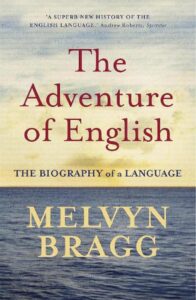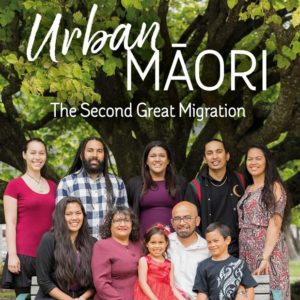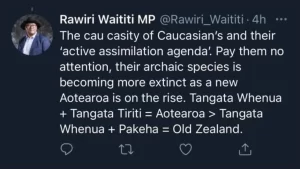New Zealand English: A Conversation with Kelly Kahukiwa
March 26, 2025
By AHNZ
 The following was a useful conversation with a visitor to AHNZ named Kelly Kahukiwa. Our topic was Is New Zealand English Endangered?
The following was a useful conversation with a visitor to AHNZ named Kelly Kahukiwa. Our topic was Is New Zealand English Endangered?
Of course there is a Kiwi accent that is part of our cultural heritage. Being a new country our traditions are young too but that is how all dialects and language forks must begin. A New Zealander of, say, 50 years ago, could easily have been picked out from an Australian, Canadian, South African, New Foundlander, English, American, etc. Writing and spelling, yes, but in accent most certainly yes.
Think of the English of Barry Crump, Ewen Gilmour, Fred Dagg, or Rhys Darby. We had regional accents of our own that owed their anonymous creation to the various settler groups who build New Zealand. As communication lines improved they blended. Of course there was a threat from The State as per usual which inflicted its received pronunciation elocution through the airwaves which they exclusively controlled. You can still detect it in the lilt of old government broadcasters like Sean Plunket and Kathryn Ryan. There is a story, perhaps a myth, that government broadcasters accessed a drug in pill form that let them speak that way. As an effect of the Punk movement, Karyn Hay broke that wall down by hosting Radio with Pictures (1981) in her own Kiwi voice.
Then, of course, there has been the other government assault of another contrived and enforced form of speech: Te Reo. This was not Maori English which was a very authentic, natural, colloquial form of speech just like New Zealand English. It too was pushed down by the State’s standard version and, so we are told, wasn’t simply cooked up at a university 30-odd years ago but is something like 1000 years old! During our Aotearoa New Zealand Culture era it had the upper hand and became the lingua franca of all corporate, government, media, and academic communications. Towns, mountains, institutions, localities, government departments, etc. all had their names replaced with Te Reo names even if they had to be invented out of thin air to replace meaningful heritage names. The Maori English, that spoken by Billy T James, I last heard on a 2 Degrees radio advertisement in the 2010s. After a few days it was abruptly, but quietly, pulled in a way reminiscent of the Washday at the Pa controversy.
Based on Radio Hauraki the tipping point of the new mainstream Wokery came in 2021. The last of the Generation Xers were now middle-aged and yielding the linguistic territory to Millennials who had been coached all their lives in government schools with the New Speak. In 2019 AHNZ recorded clear evidence of how the old mainstream was being persecuted live on air by the new one in the form of Aucklander, Marcus Lush, shaming South Islanders for using their own indigenous language to describe their own territory. Ref. 2010s: New Zealand English Endangered?
A Conversation with Kelly Kahukiwa
To the above post came a series of comments to AHNZ by Mr Kelly Kahukiwa. He appears to make his living as a Maori Cultural consultant and educator. And, he’s one of those people who think they can heal kauri trees with ancient Maori vibration magic. Another recent credential is that he blew the eye-glasses right off Dr Maggie Buxton’s face in under 60 seconds while leaving her Woke White Woman multiple humanities degrees safe and secure on her wall. Ref. AwhiWorld – Transdisciplinary Lab, Youtube (2024)
 Kahukiwa: Have you read ‘The Adventure of English’ Melvyn Bragg?? That well researched book, by a man well versed in the language, is saying something very different about the dynamic ever changing, English language , which is interacting and absorbing the languages in which it interfaces and attempts to displace, as a survival mechanism..sounds like you are trying to create an argument here, which is in fact, an argument against the academics in the English language’s country of origin. I may be wrong, but this is how its coming across on your post, which is attacking a language (te reo) which also has to absorb and adapt. That is how languages survive and English being the greatest example of that. But don’t take my word for it, Melvyn Bragg’s extensive research highlights all of that and much more. It made me appreciate English and other languages and their survival mechanisms much more after reading this book. English is here today and here to stay. You need not worry about that. Te reo Māori is also alive today and here to stay.
Kahukiwa: Have you read ‘The Adventure of English’ Melvyn Bragg?? That well researched book, by a man well versed in the language, is saying something very different about the dynamic ever changing, English language , which is interacting and absorbing the languages in which it interfaces and attempts to displace, as a survival mechanism..sounds like you are trying to create an argument here, which is in fact, an argument against the academics in the English language’s country of origin. I may be wrong, but this is how its coming across on your post, which is attacking a language (te reo) which also has to absorb and adapt. That is how languages survive and English being the greatest example of that. But don’t take my word for it, Melvyn Bragg’s extensive research highlights all of that and much more. It made me appreciate English and other languages and their survival mechanisms much more after reading this book. English is here today and here to stay. You need not worry about that. Te reo Māori is also alive today and here to stay.
AHNZ: Thanks for that. Yes I have watched his documentary an am a regular listener to his radio show.
Can you run that by me again though? You mention 4 groups: me, Melvin, academics, and Te Reo.
But it’s not clear to me if you think they all agree or who disagrees with who?
Kahukiwa: yes! great to hear you have read it.. Its a good book isn’t it?
Ok i was counting the academic research that provided Melvyn with the research that went into his book, and the acceptance of his historical accounts of the journey of English, as the representatives of academia in regard to English.
The same level of expertise also exists within te reo Māori language academics who are invested in it’s survival in the face of such a tidal wave of English language which has flooded spaces where te reo would normally sit naturally. It truly is a struggle to keep te reo alive and as you seem to be well informed, you must know about Govt policy to eradicate te reo until very recent times.
There is no way English is under threat. It is enhanced by co-existing with te reo Māori.
Language is a representative of speaking life and meaning into a culture. People who have a bi-cultural lens have more tools to appreciate the area they live in, and more tools to approach the inevitable challenges that pop up in life’s journey.
The perspective you bring up here is one which seems to be stoking an unnecessary fire of fear toward anything that isnt monocultural.
Why be fearful? The Māori world and culture is open and embracing, even after all the oppressive things that Māori have endured over time..now to hear the language come under fire again is disheartening.
You arent losing anything at all by Māori language existing alongside English. You have the option of more kai at the table, so i have written this to appeal to the part of you that is creating fear based posts, as the world is full of enough of that already. Its time we just all get stuck in and where a hand is needed to lift another one up, to just do it.
If you would like help with te reo Māori, i am happy enough to help you on your journey.
As far as the Marcus Lush pulling up the ladies on that famous talkback call goes, they never really saw the ridiculousness of how they would never accept the word ‘ camembert’ (a french word they were defending), being pronounced as Cam-im -burt..because the ladies are ‘cultured’ (their words)..yet they refuse to pronounce a Māori place name correctly..refusing and being beligerent is going to get more critiques than an attitude of ‘i tried but i can’t quite get it yet’.
It’s your page and you can do what you want and add to the rubbish being put out there about Māori, go for it..there are many pages doing that already and it’s sad.
If thats the true purpose of this page then all the best.
Te reo Māori is a beautiful language and has thousands of people who are from other cultures now embracing it.
Hope you find the joy in the journey of learning this beautiful language too one day, when you hear your kids or grandkids speaking it as their second language.
AHNZ: “tidal wave of English language which has flooded spaces where te reo would normally sit naturally.”
That being?
“you must know about Govt policy to eradicate te reo until very recent times.”
That’s a myth. I have written posts about it and would be happy to discuss with you.
“There is no way English is under threat.”
Did you not play the audio clip? Or are you mistaking the focus on New Zealand English? Certainly English per se is safe and home.
“fire of fear toward anything that isnt monocultural.”
On the contrary I’m one of the few seeking to find a way for diversity in language to co-exist without bashing people to bits the way people like Lush did. You’d benefit from reading the post to the end on the website…
“to hear the language come under fire again is disheartening.”
You might not be responding to me after all because you seem unfamiliar with what you are commenting on. But if I assume you have absorbed the material first then your comment suggests that defending my culture is an attack (“under fire”) on someone else’s. That would be a mistake.
“they refuse to pronounce a Māori place name correctly..”
You enter a debate with a closed mind when you automatically privilege your own conclusions as “correct.” If you do then everything you do after that is disingenuous. Can you refrain?
“Te reo Māori is a beautiful language and has thousands of people who are from other cultures now embracing it.”
We’ll never know if that’s true until we stop attacking people who don’t conform or pumping millions of stolen money into propping it up as a welfare recipient like some broke old man on disability.
Thanks for being thoughtful. But if you think too much you might upset your cohort. They’ll bring you back into the Matrix if any progress is made here. But let’s chance it eh?
Kahukiwa: i have listened to your post on youtube..again and still am missing the boat on what you are referring to. It seems to be the same monocultural narrative that once dominated , but is now being moved along and upgraded and i see your post as wanting to snap NZ back into a monocultural paradigm. Im not sure what generation you are speaking on behalf of. I am Māori and i fully respect the views of my family who aren’t Māori and who have also struggled with the status quo being uncomfortably transformed into something new, by more recent generations.
I feel that they are entitled to do things as they wish, as you are too..but these viewpoints and opinions will be checked to see if they are relevant..
I think the view that is being raised in the posts here is more archaic than anarchistic.
I respect that, as i respect the view of the ladies in the Marcus Lush interview.
They are showing respect to one culture but not another and its their choice to do it on National talkback.. they got roasted and maybe it may have at least opened up more peoples minds as to why they are fearful of misrepresenting peoples names. Im sure you like people pronouncing your name properly..so why not use education to do what its designed for, and help shine light on the unknown..like pronouncing names correctly.
Sports broadcasters like Grant Nisbett have earnestly tried to improve their pronunciation on TV, to honor the names of our international sportspeople and their families they represent..and he has been also had a hard road..the man gets all my respect for trying and realising that the effort is worth its weight in gold ..its not perfect and it doesn’t matter..he tries with a good heart.
I cant respond to all you have listed from my message, in all respect i don’t want to engage in too much debate but im providing a perspective that as an inspired te reo Māori speaker and an inspired English speaker, its not perfection of the language that massages my ears, its the effort put in that massages the heart and thats the key to what im saying here.
Thanks for your responses and i will try and absorb more of what you are saying, and hope im not completely missing the mark here
Kahukiwa: do you know the beneficiary status amd percentages by cultural identity in NZ..? I think you will be very surprised if you look up the actual numbers..you are offending multitudes of people who are beneficiaries, and perhaps people from your own culture
Kahukiwa: are you a student of Elizabeth Rata? She also is mis-educating the masses by saying that language assimilation never happened and that it was good for the native people..not many people are holding on to that Chief Justice Prendergast ideal any longer
 AHNZ: “am missing the boat on what you are referring to….i see your post as wanting to snap NZ back into a monocultural paradigm.”
AHNZ: “am missing the boat on what you are referring to….i see your post as wanting to snap NZ back into a monocultural paradigm.”
Well how so? Can you present text to back up this interpretation or did it come from within you?
“these viewpoints and opinions will be checked to see if they are relevant..”
Was that a euphemism for the beating my elders took on live radio and then again afterwards?
“They are showing respect to one culture but not another ”
Like yourself? You say New Zealand English “once dominated” and will now be “moved along” and “upgraded.” That sounds less like showing respect and more like showing the door don’t you think?
“Im sure you like people pronouncing your name properly…like pronouncing names correctly.”
You’ve doubled-down on privileging your own language tribe as “correct” and “proper” thus Othering fellow New Zealanders in their own country. All while accusing them of monoculturalism.
“I cant respond to all you have listed from my message,”
Might be an idea to restrict your commenting to within your own bandwidth limits. I will be reading everything you write even if you don’t mean for it.
“Sports broadcasters like Grant Nisbett have earnestly tried to improve their pronunciation..”
Those lacking such “earnestness” get the sack and perhaps re-appear on RTR or The Platform.
 Kahukiwa: umm English is constantly moving along and upgrading..did you actually watch Melvyn Braggs doco? Because as i said before, your arguments are against his and his academic peers more so than anyones.
Kahukiwa: umm English is constantly moving along and upgrading..did you actually watch Melvyn Braggs doco? Because as i said before, your arguments are against his and his academic peers more so than anyones.
The ladies who were on the national radio showing their resistance to learning something outside of their mono culture was their choice to do that. They called Marcus not the other way around. The first older lady I can totally empathise with (Mary?)..the second lady not so easy as her personality was less likeable ..but she is still entitled to her own opinion, it was her choice to expose that and not ‘read the room’ as to who was listening. If only Māori were critiquing her your point would hit home with me..but that’s not the case.
Your use of ‘othering’ isnt hitting home with me either .. you seem more status quo with your angle, then the anarchistic persona that is being portrayed.
Isn’t status quo the antithesis of anarchy?
AHNZ: “your arguments are against his”
Well, I can take it. Present them to me and I’ll take the consequences.
But don’t imagine that telling me I’m on the wrong side of the BBC was all you had to say to change my mind!
” was their choice to do that.”
They did not consent to be abused.
“Isn’t status quo the antithesis of anarchy?”
This is the most Anarchistic thing you’ll see on the topic. What could be more radical in 2025 than standing up for New Zealand English in the midst of Aotearoa Culture?
As you saw from Marcus and other contemporary examples it is your point of view that is the orthodoxy. The Archy. There’s nothing Anarchic about being Woke, talking Maori, and wearing your mask to your next booster shot.
Kahukiwa: yep i appreciate that comment about anarchy as you view your actions as anarchistic..to me it looks like you are pro mono culture which is still the status quo institutionally..and its the institution where English language has been dominant since 1854..as that rapidly moved to entrench that system over the top of what was the status quo, te reo Māori..
Institutionalised English language shoved it aside.
it was anarchy to support te reo Māori’s revitalisation 5 years ago .where were the anarchists then?
Its ok to have a different view on what anarchy is..to me your viewpoint here is status quo and archaic .but i see my viewpoint in your eyes may be the same. I accept that and am happy to move on seeing things from a different viewpoint. Thanku
 AHNZ:“to me it looks like you are pro mono culture”
AHNZ:“to me it looks like you are pro mono culture”
No you are. Lush is. My position is diversity and yours is not. Think about it.
“Institutionalised English language shoved it aside.”
That is incorrect. New Zealand was started by English-speaking people. There was nothing to shove. Maoris migrated to New Zealand during what is called the Second Great Migration.
“your viewpoint here is status quo and archaic”
Hell of a thing to pull off. To be a thing and the opposite at the same time!
Surely you’re not so far gone that you can’t correct illogical statements like these?
“am happy to move on seeing things from a different viewpoint. ”
But you don’t do you? No attempt has been made to understand how someone else thinks here at all. Nothing was processed.
Only now do I realise your summoning Melvyn Bragg was supposed to support YOUR point of view. You were so sure of it you didn’t even think you had to copy his argument just a thumbnail of the book cover. Your premise not that English changed. Your premise is that English changed to your “correct” version. Therefore it’s appropriate to abuse old ladies, deplatform, cancel, exile, and dismiss the Other like it’s 1933.
Kahukiwa: ok you got your realisations and now you can continue on with your own definition of anarchy which im fine with.
I think Peeni Henare standing up and doing a haka in parliament in support of another party is seen by some as being pretty anarchistic..but we see things differently. I’m ok with seeing things differently. Some of your points im not going to engage in as i think they are from a place of wanting to argue for the sake of having someone to oppose you.
No thanks.
AHNZ:An elected politician practising politics in the heart of the debating chamber of the house of representatives in session and then gaming the protocol to keep it cool with The Man’s rule book….
Is your idea of Anarchistic? Yo dude, that’s a scene right out of Escape from LA or Falling Down…
“i think they are from a place of wanting to argue for the sake of having someone to oppose you.”
Let’s say they are. But that’s not a silver bullet to let you blind yourself to every point I make. I hope you will have a quiet reflection on this conversation at your own pace. Don’t be so sure Melvin is on your side. Maoris will come to regret letting The State use their language and culture as political cover when they wear it out one day.
Concluding Remarks
 Both sides in this debate accept Kahukiwa’s main theme that New Zealand English is evolving and appreciate Melvyn Bragg’s excellent demonstration of this.
Both sides in this debate accept Kahukiwa’s main theme that New Zealand English is evolving and appreciate Melvyn Bragg’s excellent demonstration of this.
However, Kahukiwa is consistently unable to consider what it is evolving into. He takes for granted that the (state-sponsored) mainstream narrative will win or has won hegemony. It’s as if Melvyn Bragg or Manifest Destiny or Natural Selection somehow picked him as the chosen one. I don’t think he can intellectually reconcile the idea someone can accept evolution and change without also accepting that he is the paragon of that change. Although he is the current status quo he thinks he is the disruptor and innovator. These assumptions were probably enough to “win” his arguments for many years without being challenged. Now he has met challenge he is unwilling to check his premises.
There was a great deal of filibustering and conspicuous kindness which probably also carries the day for Kahukiwa should the other side blow a fuse and get angry. AHNZ replied with less content. Yet, Kahukiwa complained he couldn’t keep up with even some of the many tangents he had generated. That was probably unusual too for someone used to out-talking others into surrender.
Instead of considering a different point of view he plunged into Cognitive Dissonance. Trotted out old saws like the idea the government’s policy was to eradicate the Maori language and absolutely did not want to be contradicted on that. Ref. 1931: Policy of Adaptation, AHNZ
Funny, grasping, tangents resulted. I think an open, creative, mind would do some new thinking. Instead, Kahukiwa reached deeper into his grab-bag of pre-mixed arguments. A guy who couldn’t keep up with replies to his existing arguments started throwing random shots about “beneficiary status” and “Elizabeth Rata” etc. in a hit-and-hope scatter pattern. Ignored.
This is the important conversation New Zealanders are not having which is why I’ve copied it to the page. It didn’t get very far because of this cognitive wall. It’s also a financial and professional wall, a family and fraternal wall. What would happen to Kahukiwa’s livelihood and identity if his beliefs were examined? Radical change. Yet he’s happy to mete that out to generations of others and to defend the mainstream media (eg Lush) and The State doing it to others (so long as they’re not his group.)
To be fair, Kahukiwa’s medium is probably speech more than it is written. He might have done better otherwise. Better still if speaking to a fawning white woman with multiple Wokester degrees…but those are going out of circulation shortly. Time to evolve again?
—
Image ref. Samoset visits the Pilgrim Fathers in 1621. From the cover of The Adventure of the English, Melvyn Bragg (2004)
2 thoughts on "New Zealand English: A Conversation with Kelly Kahukiwa"
Leave a Reply to Peter Stevens Cancel reply
 Like Comment Share
Like Comment Share






On Maori pronunciation I’m interested in when the Nga Puhi dialect was made the de facto model (in the same way a London suburb’s speech was made “Received English”). I still recall from early 1970s my father asking 3 fluent speakers of Maori, how to pronounce [Lake] Taupo, and got 3 [quite] different responses (and numbers of syllables). Why was there the insistence that Wanganui should have had the f sound and be rewritten Whanganui.
The Greater Oxford Dictionary has about 500,000 words. How many did Maori have 50 years ago ~ about 5000?? So is it really fit for purpose nowadays?Making up words or a Pidgin language seems false; and to insist that people learn this Pidgin and pronounce it all correctly seems sad.
I remember watching a cooking program on Maori TV, and the chef was using words like carrot-y; meat-y; onion-y to describe his ingredients – would have been better to retain English.
If I ever find out I’ll write a post.
You observe here that English is expected to change its words if they are borrowed from Maori. However most Maori words (“carrot-y”) are loan words and pay no such tribute.